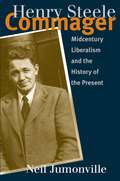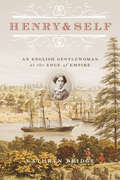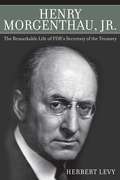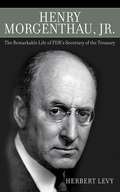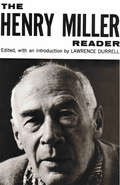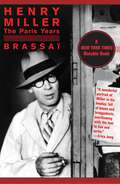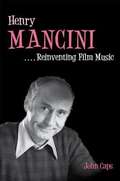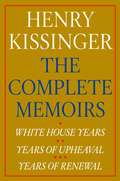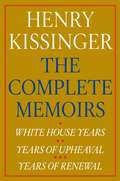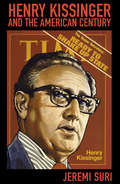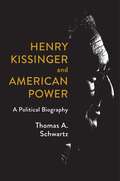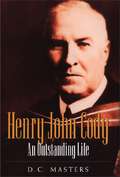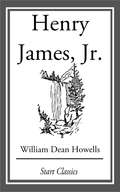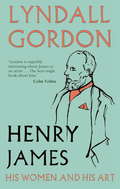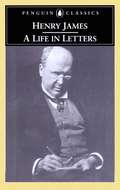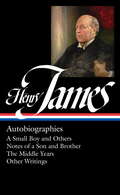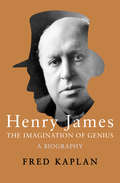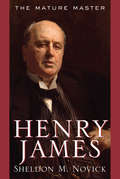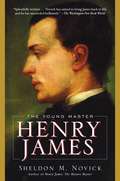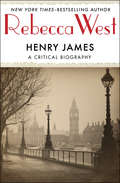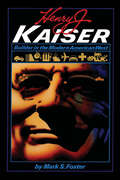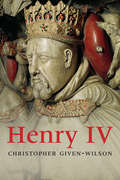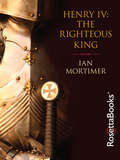- Table View
- List View
Henry Steele Commager
by Neil JumonvilleHistorian Henry Steele Commager (1902-1998) was one of the leading American intellectuals of the mid-twentieth century. Author or editor of more than forty books, he taught for decades at New York University, Columbia University, and Amherst College and was a pioneer in the field of American studies. But Commager's work was by no means confined to the halls of the university: a popular essayist, lecturer, and political commentator, he earned a reputation as an activist for liberal causes and waged public campaigns against McCarthyism in the 1950s and the Vietnam War in the 1960s. As few have been able to do in the past half-century, Commager united the two worlds of scholarship and public intellectual activity. Through Commager's life and legacy, Neil Jumonville explores a number of questions central to the intellectual history of postwar America. After considering whether Commager and his associates were really the conservative and conformist group that critics have assumed them to be, Jumonville offers a reevaluation of the liberalism of the period. Finally, he uses Commager's example to ask whether intellectual life is truly compatible with scholarly life.
Henry & Self: An English Gentlewoman at the Edge of Empire
by Kathryn BridgeAn intimate portrait of privilege and struggle, scandal and accolade, from the Old World to the new colonies of Vancouver's Island and British Columbia.At the age of 33, Sarah Crease left her home in England to travel with her young family to a farflung outpost of the British Empire on the Pacific coast of North America. The detailed journals, letters and artwork she created over the next half century as she and her husband, Henry, established themselves in the New World offer a rich window into the private life and views of an English colonist in British Columbia.This is a woman's story in her own words. It is also a story of the times she lived in, and of how her class, social standing and role as a settler shaped her relationships with the world around her. Henry & Self is the personal account of a remarkable woman who lived through nearly a century of colonial history, but it is also a unique perspective on the beliefs and motivations that shaped that century.
Henry Morgenthau Jr.: The Remarkable Life of FDR's Secretary of the Treasury
by Herbert LevyA fascinating exploration of early to mid-twentieth-century politics as seen through the eyes of a Roosevelt technocrat. History seems to repeat itself. With ongoing wars abroad and the collapse of financial institutions at home, Americans rely on President Barack Obama and Secretary of the Treasury Jacob Lew to bring about positive change. When the US stock market collapsed in 1928 and World War II broke out, the nation turned to Franklin D. Roosevelt and his Secretary of the Treasury, Henry Morgenthau, Jr. , for leadership. Henry Morgenthau, Jr. explores the life of this native New Yorker. Born into a prominent Jewish family, Henry Morgenthau, Jr. , became a controversial figure in politics. Yet, his contributions were integral to social, political, and economic milestones in American history, all while he grappled with his identity as an American Jew during the atrocities of WWII in Europe. This new biography offers a glimpse of yesterday and lessons for today. Author Herbert Levy offers an extensively researched life of this important American leader. From thorough research in the archives of Hyde Park to careful study of Morgenthau’s letters, Levy delivers an in-depth account of the fascinating life of this remarkable man. This book explores the complex and oftentimes frustrating world in which Morgenthau was forced to live and illuminates his odyssey as a Roosevelt technocrat.
Henry Morgenthau, Jr.
by Herbert LevyHenry Morgenthau, Jr. was a young man living in an interesting political and social atmosphere. Surrounded by people who viewed the world through a Social Darwinist lens, and grappling with his identity as an American Jew during the atrocities of WWII in Europe, Henry Morgenthau, Jr. played an integral role as Roosevelt's secretary of the treasury during a tough economic and political time. Henry Morgenthau, Jr. explores the life of this native New Yorker, growing up in a business-minded family, spending most of his teenage years at boarding school, and feeling isolated from his peers. Morgenthau found true passion in farming, and it served him well during the years that FDR was governor of New York and again after Morgenthau's retirement from political life. Morgenthau established not only a working relationship with FDR during his presidency, but also a personal relationship, one that allowed him some freedom of expression in what he viewed as a sometimes intolerant era. Herbert Levy has done extensive research at the archives in Hyde Park to include many of Morgenthau's personal letters in this in-depth account of the man who crafted a controversial plan for the reconstitution of Germany. This book explores the complex and oftentimes frustrating world in which Morgenthau was forced to live and illuminates his odyssey as a Roosevelt technocrat.
The Henry Miller Reader (Essay Index Reprint Ser.)
by Henry Miller Lawrence DurrellA collection of works spanning the entire career of great 20th-century American writer Henry Miller, edited and introduced by Lawrence Durrell. In 1958, when Henry Miller was elected to membership in the American Institute of Arts and Letters, the citation described him as: "The veteran author of many books whose originality and richness of technique are matched by the variety and daring of his subject matter. His boldness of approach and intense curiosity concerning man and nature are unequalled in the prose literature of our times." It is most fitting that this anthology of "the best" of Henry Miller should have been assembled by one of the first among Miller’s contemporaries to recognize his genius, the eminent British writer Lawrence Durrell. Drawing material from a dozen different books Durrell has traced the main line and principal themes of the "single, endless autobiography" which is Henry Miller’s life work. "I suspect," writes Durrell in his Introduction, "that Miller’s final place will be among those towering anomalies of authorship like Whitman or Blake who have left us, not simply works of art, but a corpus of ideas which motivate and influence a whole cultural pattern." Earlier, H. L. Mencken had said, "his is one of the most beautiful prose styles today," and the late Sir Herbert Read had written that "what makes Miller distinctive among modern writers is his ability to combine, without confusion, the aesthetic and prophetic functions." Included are stories, "portraits" of persons and places, philosophical essays, and aphorisms. For each selection Miller himself prepared a brief commentary which fits the piece into its place in his life story. This framework is supplemented by a chronology from Miller’s birth in 1891 up to the spring of 1959, a bibliography, and, as an appendix, an open letter to the Supreme Court of Norway written in protest of the ban on Sexus, a part of which appears in this volume.
Henry Miller: The Paris Years
by Brassaï&“A wonderful portrait of Miller in his heyday: full of beans and braggadocio, overflowing with the lust to live and write.&”—Erica Jong His years in Paris were the making of Henry Miller. He arrived with no money, no fixed address, and no prospects. He left as the renowned if not notorious author of Tropic of Cancer and Tropic of Capricorn. Miller didn&’t just live in Paris—he devoured it. It was a world he shared with Brassaï, whose work, first collected in Paris by Night, established him as one of the greatest photographers of the twentieth century and the most exquisite and perceptive chronicler of Parisian vice. In Miller, Brassaï found his most compelling subject. Henry Miller: The Paris Years is an intimate account of a writer&’s self-discovery, seen through the unblinking eye of a master photographer. Brassaï delves into Miller&’s relationships with Anaïs Nin and Lawrence Durrell, as well as his hopelessly tangled though wildly inspiring marriage to June. He uncovers a side of the man scarcely known to the public, and through this careful portrait recreates a bright and swift-moving era. Most of all, Brassaï evokes their shared passion for the street life of the City of Light, captured in a dazzling moment of illumination.
Henry Mancini: Reinventing Film Music (Music in American Life)
by John CapsHenry Mancini, the first publicly successful and personally recognizable film composer in history, has practically become a Hollywood brand name. In his lifetime, he sold thirty million albums and won four Oscars and twenty Grammy awards. Through Mancini, mere background music in movies became part of pop culture--an expression of sophistication and wit with a modern sense of cool and a lasting lyricism that has not dated. The first comprehensive study of Mancini's music, Henry Mancini: Reinventing Film Music describes how the composer served as a bridge between the Big Band period of World War II and the impatient eclecticism of the Baby Boomer generation, between the grand formal orchestral film scores of the past and a modern American minimalist approach. Mancini's sound seemed to capture the bright, confident, welcoming voice of the middle class's new efficient life: interested in pop songs and jazz, in movies and television, in outreach politics but also conventional stay-at-home comforts. As John Caps shows, Mancini easily combined it all in his music. Mancini wrote his first dramatic music for a radio series in 1950. By the mid-1960s, he wielded influence in Hollywood and around the world with his iconic scores: dynamic jazz for the noirish detective TV show Peter Gunn, the sly theme from The Pink Panther, and his wistful folk song "Moon River" from Breakfast at Tiffany's. Following the evolution of Mancini's style, Caps traces the history of movie scoring in general: from the jazz-pop of the 1960s to the edgier, electro-funk harmonies of the Watergate 1970s, from the revisionist 1980s marked by New Age trends and new jazz chords to the frustrating New Hollywood of the 1990s when films were made by committees of lawyers rather than by artisans. Through insightful close readings of key films, Caps traces Mancini's collaborations with important directors and shows how he homed in on specific dramatic or comic aspects of each film to create musical effects through clever instrumentation, eloquent melodies, and the strong narrative qualities of his scores. Accessible and engaging, this fresh view of Mancini's oeuvre and influence will delight and inform fans of film and popular music.
Henry Knox
by Anita SilveyA hearty eater, dapper dresser, bookseller to Loyalists and Patriots alike,and married into a staunch Loyalist family, Henry Knox may seem an unlikely hero. But his fascination with warfare and strategy and his support of the Patriot cause prepared him to do what no one else thought was possible: transport heavy artillery from Fort Ticonderoga, up and down snow-covered hills and across frozen lakes, to relieve the siege of Boston. The dramatic story of his achievements is all the more satisfying for being absolutely true, a little-known episode in the history of the American Revolution. Source notes, time line, bibliography, map.
Henry Kissinger The Complete Memoirs eBook Boxed Set: White House Years; Years of Upheaval; Years of Renewal
by Henry KissingerA Simon & Schuster eBook. Simon & Schuster has a great book for every reader.
Henry Kissinger The Complete Memoirs eBook Boxed Set
by Henry KissingerThis e-book box set includes the complete memoirs of Henry Kissinger, detailing his life and work.<P> White House Years: One of the most important books to come out of the Nixon Administration, White House Years covers Henry Kissinger’s first four years (1969–1973) as Assistant to the President for National Security Affairs.<P> Years of Upheaval: This second volume of Henry Kissinger’s monumental memoirs covers his years as President Richard Nixon’s Secretary of State (1972–1974), including the ending of the Vietnam War, the 1973 Middle East War and oil embargo, Watergate, and Nixon’s resignation. Years of Upheaval opens with Dr. Kissinger being appointed Secretary of State.<P> Years of Renewal: This third and final volume of memoirs completes a major work of contemporary history. The third & final volume begins with the resignation of Nixon and takes the reader through the years of Ford's administration, in which Kissinger continued to play a decisive role. Years of Renewal is the triumphant conclusion of a major achievement and a book that will stand the test of time as a historical document of the first rank.
Henry Kissinger The Complete Memoirs E-book Boxed Set
by Henry KissingerThis e-book box set includes the complete memoirs of Henry Kissinger, detailing his life and work.White House Years: One of the most important books to come out of the Nixon Administration, White House Years covers Henry Kissinger's first four years (1969-1973) as Assistant to the President for National Security Affairs.Years of Upheaval: This second volume of Henry Kissinger's monumental memoirs covers his years as President Richard Nixon's Secretary of State (1972-1974), including the ending of the Vietnam War, the 1973 Middle East War and oil embargo, Watergate, and Nixon's resignation. Years of Upheaval opens with Dr. Kissinger being appointed Secretary of State.Years of Renewal: This third and final volume of memoirs completes a major work of contemporary history. The third & final volume begins with the resignation of Nixon and takes the reader through the years of Ford's administration, in which Kissinger continued to play a decisive role. Years of Renewal is the triumphant conclusion of a major achievement and a book that will stand the test of time as a historical document of the first rank.
Henry Kissinger and the American Century: Global Revolution And The Rise Of Detente
by Jeremi SuriWhat made Henry Kissinger the kind of diplomat he was? What experiences and influences shaped his worldview and provided the framework for his approach to international relations? Jeremi Suri offers a thought-provoking, interpretive study of one of the most influential and controversial political figures of the twentieth century. Drawing on research in more than six countries in addition to extensive interviews with Kissinger and others, Suri analyzes the sources of Kissinger's ideas and power and explains why he pursued the policies he did. Kissinger's German-Jewish background, fears of democratic weakness, belief in the primacy of the relationship between the United States and Europe, and faith in the indispensable role America plays in the world shaped his career and his foreign policy. Suri shows how Kissinger's early years in Weimar and Nazi Germany, his experiences in the U. S. Army and at Harvard University, and his relationships with powerful patrons--including Nelson Rockefeller and Richard Nixon--shed new light on the policymaker. Kissinger's career was a product of the global changes that made the American Century. He remains influential because his ideas are rooted so deeply in dominant assumptions about the world. In treating Kissinger fairly and critically as a historical figure, without polemical judgments, Suri provides critical context for this important figure. He illuminates the legacies of Kissinger's policies for the United States in the twenty-first century.
Henry Kissinger and American Power: A Political Biography
by Thomas A. Schwartz[Henry Kissinger and American Power] effectively separates the man from the myths." —The Christian Science Monitor | Best books of August 2020The definitive biography of Henry Kissinger—at least for those who neither revere nor revile himOver the past six decades, Henry Kissinger has been America’s most consistently praised—and reviled—public figure. He was hailed as a “miracle worker” for his peacemaking in the Middle East, pursuit of détente with the Soviet Union, negotiation of an end to the Vietnam War, and secret plan to open the United States to China. He was assailed from the left and from the right for his indifference to human rights, complicity in the pointless sacrifice of American and Vietnamese lives, and reliance on deception and intrigue. Was he a brilliant master strategist—“the 20th century’s greatest 19th century statesman”—or a cold-blooded monster who eroded America’s moral standing for the sake of self-promotion?In this masterfully researched biography, the renowned diplomatic historian Thomas Schwartz offers an authoritative, and fair-minded, answer to this question. While other biographers have engaged in hagiography or demonology, Schwartz takes a measured view of his subject. He recognizes Kissinger’s successes and acknowledges that Kissinger thought seriously and with great insight about the foreign policy issues of his time, while also recognizing his failures, his penchant for backbiting, and his reliance on ingratiating and fawning praise of the president as a source of power. Throughout, Schwartz stresses Kissinger’s artful invention of himself as a celebrity diplomat and his domination of the medium of television news. He also notes Kissinger’s sensitivity to domestic and partisan politics, complicating—and undermining—the image of the far-seeing statesman who stands above the squabbles of popular strife. Rounded and textured, and rich with new insights into key dilemmas of American power, Henry Kissinger and American Power stands as an essential guide to a man whose legacy is as complex as the last sixty years of US history itself.
Henry John Cody: An Outstanding Life
by Donald Campbell MastersHenry John Cody was born in Embro, Ontario, on December 6, 1868. He was a great man in his day, in Toronto especially, in the Anglican church, in educational circles (both in school and university), and in the Conservative Party, but now, some forty years after his death, he is almost forgotten and indeed unheard of by anyone under 50.
Henry James, Jr.
by William Dean HowellsWilliam Dean Howells (1837-1920) was an American realist author and literary critic. He wrote his first novel, Their Wedding Journey, in 1871, but his literary reputation really took off with the realist novel A Modern Instance, published in 1882, which describes the decay of a marriage. His 1885 novel The Rise of Silas Lapham is perhaps his best known, describing the rise and fall of an American entrepreneur in the paint business. His social views were also strongly reflected in the novels Annie Kilburn (1888) and A Hazard of New Fortunes (1890). While known primarily as a novelist, his short story "Editha" (1905) - included in the collection Between the Dark and the Daylight (1907) - appears in many anthologies of American literature. Howells also wrote plays, criticism, and essays about contemporary literary figures such as Ibsen, Zola, Verga, and, especially, Tolstoy, which helped establish their reputations in the United States. He also wrote critically in support of many American writers. It is perhaps in this role that he had his greatest influence.
Henry James: His Women and His Art
by Lyndall GordonJames's friendship with Constance Fenimore Woolson ended in 1894 when he tried to drown a boatload of her dresses in the Venetian lagoon; she had fallen to her death three months before. It was an elusive friendship that echoed his mysterious relationship with Minny Temple who had died twenty years earlier. From their graves, these two women haunted his imagination and his fiction, inspiring the creation of his heroines.
Henry James: A Life in Letters
by James HenryJames's correspondents included presidents and prime ministers, painters and great ladies, actresses and bishops, and the writers Robert Louis Stevenson, H.G. Wells and Edith Wharton. This fully-annotated selection from James's eloquent correspondence allows the writer to reveal himself and the fascinating world in which he lived. The letters provide a rich and fascinating source for James' views on his own works, on the literary craft, on sex, politics and friendship. Together they constitute, in Philip Horne's own words, James' 'real and best biography'.
Henry James: A Small Boy and Others / Notes of a Son and Brother / The Middle Years / Other Writings
by Henry James Philip HorneThe most extensive collection of Henry James's autobiographical writings ever published offers a revelatory self-portrait from one of America's supreme novelists and his famous family. In 1911, deeply affected by the death of his brother William the year before, Henry James began working on a book about his early life. As was customary for James in his later years, he dictated his recollections to his secretary Theodora Bosanquet, who recalled how "a straight dive into the past brought to the surface treasure after treasure." A Small Boy and Others (1913) and the two autobiographical books that followed--Notes of a Son and Brother (1914) and the incomplete, posthumously published The Middle Years--stand with his later novels as one of the enduring triumphs of his final years. Not only did James create one of the singular self-portraits in American literature, he also fashioned a richly detailed account of his renowned family, especially his father, the social philosopher Henry James Sr., his brother William, and his dear cousin Minny Temple, inspiration for the heroines of two of his greatest novels, The Portrait of a Lady and The Wings of the Dove.Rounding out the volume is a selection of eight other personal reminiscences and, as an appendix, his secretary's insightful and affectionate memoir, "Henry James at Work."From the Hardcover edition.
Henry James: The Imagination of Genius, A Biography
by Fred KaplanA stunning biography of the magisterial author behind The Portrait of a Lady and The AmbassadorsHenry James is an absorbing portrait of one of the most complex and influential nineteenth-century American writers. Fred Kaplan examines James&’s brilliant and troubled family—from his brother, a famous psychologist, to his sister, who fought with mental illness—and charts its influence on the development of the artist and his work. The biography includes a fascinating account of James&’s life as an American expatriate in Europe, and his friendships with Edith Wharton and Joseph Conrad. Compressing a wealth of research into one engrossing and richly detailed volume, Henry James is a compelling exploration of its subject.
Henry James: The Mature Master
by Sheldon M. NovickThe New York Times compared Sheldon M. Novick&’s Henry James: The Young Master to &“a movie of James&’s life, as it unfolds, moment to moment, lending the book a powerful immediacy.&” Now, in Henry James: The Mature Master, Novick completes his super, revelatory two-volume account of one of the world&’s most gifted and least understood authors, and of a vanished world of aristocrats and commoners. Using hundreds of letters only recently made available and taking a fresh look at primary materials, Novick reveals a man utterly unlike the passive, repressed, and privileged observer painted by other biographers. Henry James is seen anew, as a passionate and engaged man of his times, driven to achieve greatness and fame, drawn to the company of other men, able to write with sensitivity about women as he shared their experiences of love and family responsibility. James, age thirty-eight as the volume begins, basking in the success of his first major novel, The Portrait of a Lady, is a literary lion in danger of being submerged by celebrity. As his finances ebb and flow he turns to the more lucrative world of the stage–with far more success than he has generally been credited with. Ironically, while struggling to excel in the theatre, James writes such prose masterpieces as The Wings of the Dove and The Golden Bowl. Through an astonishingly prolific life, James still finds time for profound friendships and intense rivalries. Henry James: The Mature Master features vivid new portraits of James&’s famous peers, including Edith Wharton, Oscar Wilde, and Robert Louis Stevenson; his close and loving siblings Alice and William; and the many compelling young men, among them Hugh Walpole and Howard Sturgis, with whom James exchanges professions of love and among whom he thrives. We see a master converting the materials of an active life into great art. Here, too, as one century ends and another begins, is James&’s participation in the public events of his native America and adopted England. As the still-feudal European world is shaken by democracy and as America sees itself endangered by a wave of Jewish and Italian immigrants, a troubled James wrestles with his own racial prejudices and his desire for justice. With the coming of world war all other considerations are set aside, and James enlists in the cause of civilization, leaving his greatest final works unwritten. Hailed as a genius and a warm and charitable man–and derided by enemies as false, effeminate, and self-infatuated–Henry James emerges here as a major and complex figure, a determined and ambitious artist who was planning a new novel even on his deathbed. In Henry James: The Mature Master, he is at last seen in full; along with its predecessor volume, this book is bound to become the definitive biography. NOTE: This edition does not include a photo insert.
Henry James: The Young Master
by Sheldon M. NovickAs if Henry James himself were guiding us, we visit old Calvinist New York in the mid-nineteenth century, and share the coming-of-age of a young man whose boldness of spirit and profound capacity for affection attract both men and women to him. We journey with James through Italy and France, witness his first love affair in Paris, and settle with him in London at the height of Empire in the Victorian Age. We scale the heights of London society with him, and as the world opens to James we share with him the experience of writing a series of celebrated and successful novels, culminating with Washington Square (on which the play The Heiress is based) and his masterpiece The Portrait of a Lady. The Washington Post Book World notes: "It is no small ambition to write a biography of James that is commensurate with that master, and Sheldon Novick has done it." "Splendidly written . . . Novick has aimed to bring James back to life and he has succeeded brilliantly." -The Washington Post Book World "Like a movie of James's life, as it unfold moment to moment." -The New York Times "Masterful in bringing James and his world to life." -San Francisco Examiner-Chronicle "Beautifully written, with a grace that enables [Sheldon Novick] to weave his subject's words in and out of his own with a properly Jamesian suavity . . . Novick's account gives one a profound respect for James's persistence and power of will." -The New RepublicNOTE: This edition does not include a photo insert.
Henry James: A Critical Biography
by Rebecca WestThe first book by distinguished novelist, journalist, and literary critic Rebecca West: a biography of Henry JamesSetting the standard for a century&’s worth of criticism, Rebecca West diagnosed Henry James as an American who &“could never feel at home until he was in exile&” in this slim, readable biography, published just a few months after his death in 1916.West boldly assesses Roderick Hudson as &“not a good book,&” and displays remarkable foresight in describing Daisy Miller as a &“sad and lovely&” book that &“will strike each new generation afresh.&” An early advocate of feminist principles, she has fascinating things to say about James&’s heroines, and her division of his work into early and late periods continues to be a basic principle of Jamesian scholarship.One of the twentieth century&’s brightest minds, Rebecca West began her career as a public intellectual with this thoughtful and compelling study of a literary giant. This ebook has been professionally proofread to ensure accuracy and readability on all devices.
Henry J. Kaiser: Builder in the Modern American West
by Mark S. Foster<p>In the 1940s Henry J. Kaiser was a household name, as familiar then as Warren Buffett and Donald Trump are now. Like a Horatio Alger hero, Kaiser rose from lower-middle-class origins to become an enormously wealthy entrepreneur, building roads, bridges, dams, and housing. He established giant businesses in cement, aluminum, chemicals, steel, health care, and tourism. During World War II, his companies built cargo planes and Liberty ships. After the war, he manufactured the Kaiser-Frazer automobile. Along the way, he also became a major force in the development of the western United States, including Hawaii.<p> <p>Henry J. Kaiser: Builder in the Modern American West is the first biography of this remarkable man. Drawing on a wealth of archival material never before utilized, Mark Foster paints an evenhanded portrait of a man of driving ambition and integrity, perhaps the ultimate "can-do" capitalist. He covers Kaiser's entire life (1882–1967), emphasizing many business ventures. He demonstrates that Kaiser was the prototypical "frontier" entrepreneur who often used government and union support to tame the "wilderness."<p> <p>Though today the Kaiser industries are no longer under family management, the Kaiser legacy remains great. Kaiser played a major role in building the Hoover, Bonneville, Grand Coulee, and Shasta dams. The Kaiser-Permanente Medical Care Program still provides comprehensive health care for millions of subscribers. Kaiser-planned communities remain in Los Angeles; San Francisco; Portland, Oregon; and Boulder City, Nevada. Kaiser Engineers was actively engaged in hundreds of huge construction jobs across the nation and around the world.<p> <p>U.S. and business historians, scholars of the modern West, and general readers will all find much to absorb them in this well-written biography.<p>
Henry IV
by Chris Given-WilsonHenry IV (1399-1413), the son of John of Gaunt, duke of Lancaster, seized the English throne at the age of thirty-two from his cousin Richard II and held it until his death, aged forty-five, when he was succeeded by his son, Henry V. This comprehensive and nuanced biography restores to his rightful place a king often overlooked in favor of his illustrious progeny. Henry faced the usual problems of usurpers: foreign wars, rebellions, and plots, as well as the ambitions and demands of the Lancastrian retainers who had helped him win the throne. By 1406 his rule was broadly established, and although he became ill shortly after this and never fully recovered, he retained ultimate power until his death. Using a wide variety of previously untapped archival materials, Chris Given-Wilson reveals a cultured, extravagant, and skeptical monarch who crushed opposition ruthlessly but never quite succeeded in satisfying the expectations of his own supporters. "
Henry IV: The Righteous King
by Ian MortimerThe real life story of the Plantagenet ruler, by &“the most remarkable medieval historian of our time&” (The Times, London). The talented, confident, and intelligent son of John of Gaunt, Henry IV started his reign as a popular and charismatic king after he dethroned the tyrannical and wildly unpopular Richard II. But six years into his reign, Henry had survived eight assassination and overthrow attempts. Having broken God&’s law of primogeniture by overthrowing the man many people saw as the chosen king, Henry IV left himself vulnerable to challenges from powerful enemies about the validity of his reign. Even so, Henry managed to establish the new Lancastrian dynasty and a new rule of law—in highly turbulent times. In this book, noted historian Ian Mortimer, bestselling author of The Time Traveler&’s Guide to Medieval England and The Time Traveler&’s Guide to Elizabethan England, goes beyond the legend portrayed in Shakespeare&’s history play, and explores the political and social forces that transformed Henry IV from his nation&’s savior to its scourge.
